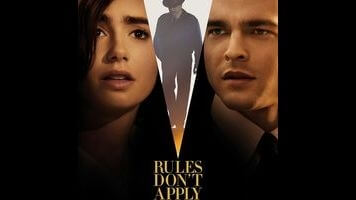The style is almost as unreal as Beatty’s Dick Tracy, if less eye-catching. The script, which has been in development since the early 1980s, compresses the famous events of Hughes’ life (the Spruce Goose, RKO Pictures, the Clifford Irving hoax, etc.) into a few years to turn Frank and Marla into witnesses to the entire Hughes legend, which is reset to the era of Beatty’s own coming of age and centered on a parody of divine conception, here imagined as a seduction by an old man in a dark hotel room. (Like Marla, Beatty and his sister, Shirley MacLaine, came from a well-educated Southern Baptist household in Virginia.) Beatty’s Hughes is interesting: Instead of the tragic inner turmoil that typified Martin Scorsese’s Hughes biopic, The Aviator, Beatty projects aloof confidence, which never wavers, regardless of whether he’s making a big business deal or dictating a 26-page memo about a lost cat from a bed in a private movie theater surrounded by bottles of piss.
In the early going, Rules Don’t Apply moves at a hectic pace, with scenes that often consist of just a few lines, jumping around a ’50s Los Angeles that is recreated through a combination of odd special effects (like using archival footage as background for driving scenes), claustrophobic interiors, and intentional camp. We are introduced to Marla and her mother (Annette Bening); to Frank and the Hughes car fleet, overseen by Levar (Matthew Broderick); to the dozens of starlets who are chauffeured to dance classes every day and collect their allowance checks at the end of the week from a fishing line lowered from the studio window. The essence of this mythic Hughes-land is in the way its secrecy guards extreme ordinariness. Behind the strict security measures is an aging man who sits alone and eats TV dinners, retains a childhood passion for the saxophone, and thinks he still looks good in a leather jacket.
Like Beatty’s earlier political projects (Bulworth, Reds, and the Hal Ashby-directed Shampoo), Rules Don’t Apply is fascinated by hypocrisy and sexual mores; it finds in the Hughes organization a microcosm of American moralism and in the titan of industry’s persona a satire of faith in the contradictory and unseen. Beatty’s capricious Hughes is never less than fascinating when he appears on screen, and is occasionally very funny (“I hired you as my doubles because you look like me, but the shoes are all wrong!” he yells before rejecting the latest round of prospective look-alikes), but the ambiguous central metaphor depends on keeping him out of the picture for as long and often as possible. The character isn’t seen for the first 30 minutes, and eventually, he disappears behind intercoms, set up in private rooms that bring to mind confession.
This leads to a memorable image of the post-seclusion Hughes (complete with long, white beard) being revealed from behind a bed curtain, like Frank Morgan in The Wizard Of Oz. But an all-powerful figure, however eccentrically realized, isn’t enough to keep a movie together. Once the initial sense of mystery dissipates, what’s left are the sketchy and contrived characterizations of Marla and Frank and a barrage of cornball humor and leaden slapstick bits that eventually betray the film’s lack of cohesion. Rules Don’t Apply is meandering and inexcusably long, alternately soft and stiff, and the only thing it settles on is the simplistic life lesson of the title. One might compare that to Woody Allen’s Whatever Works, if the structure didn’t better compare (unfavorably) to Allen’s more recent Café Society, recast as quasi-religious parable with a happy ending. Unsurprisingly, given Beatty’s cachet and long absence from the screen, he’s managed to call up quite the supporting cast; Ed Harris, Steve Coogan, and Alec Baldwin (who, oddly enough, was also in The Aviator) pop up in bit roles, all of which seem equally misplaced.


 Keep scrolling for more great stories from A.V. Club.
Keep scrolling for more great stories from A.V. Club.